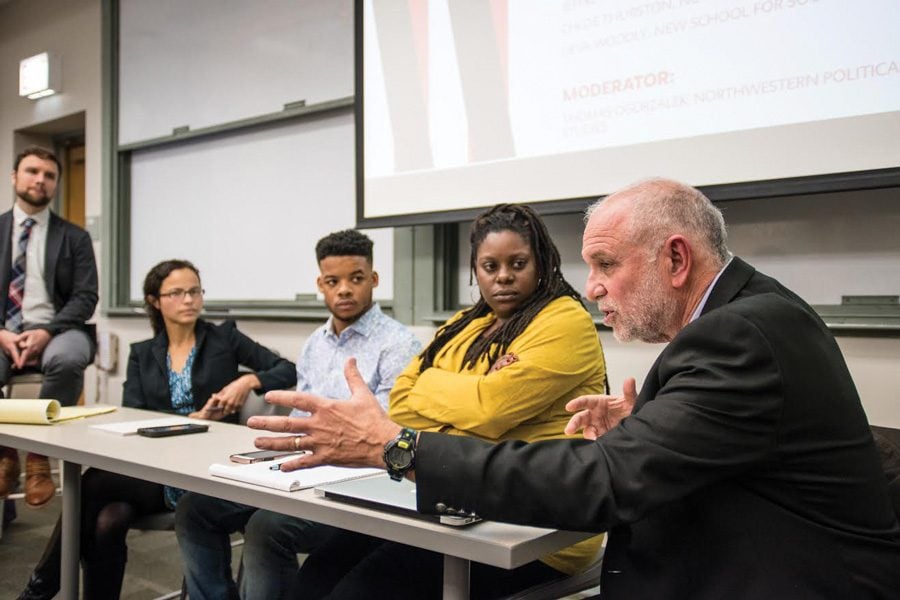Panelists discuss impact of social movements on 2016 election
Colin Boyle/The Daily Northwestern
Panelists discuss the impact social movements are having on the upcoming presidential election in University Hall on Thursday. The speakers included Northwestern and New School professors as well as a representative from the Roosevelt Institute, a liberal American think tank.
November 3, 2016
Speakers discussed how groups like Occupy, Black Lives Matter and the anti-Dakota Access Pipeline movement have changed the rhetoric of the upcoming presidential election at a panel Thursday night.
The panelists — including professors from Northwestern and the New School, as well as a representative from the Roosevelt Institute, a liberal American think tank — addressed about 30 people in University Hall. They participated in a discussion about how social movements are impacting the public sphere in the 2016 election.
The event was organized by The New School for Social Research, Chicago Democracy Project, Northwestern Center for Civic Engagement and One Book, One Northwestern. It focused on issues such as the impact of social movements on politicians, the media’s responsibility in mobilizing voters and people’s tendency to stay in their ideological comfort zones.
“This is the first election in my lifetime … where the election is actually about democracy,” said panel speaker and New School Prof. Jeffrey Goldfarb.
Goldfarb commented on how the perception of socialism has changed as a result of Vermont Sen. Bernie Sanders’ campaign and grassroot organizations that work toward normalizing socialism in America.
He also questioned some statements made by presidential candidate Donald Trump, such as his intention to build a wall between the United States and Mexico. Goldfarb discussed how Trump’s statements fire up his supporters, but said he is unsure whether the candidate will follow through with his plans.
“Does Trump really believe it? Probably not, so what are they doing?” Goldfarb said. “We have hints, we have our intuition, we have our fears, but we don’t really know what he’s going to do. It’s a fundamental problem of political language.”
Weinberg freshman Alex Neumann said he heard about the event from one of the panel speakers who teaches his first-year seminar about political inequality. He said the panel discussion inspired his interest in the structure of social movements.
“Trying to balance creating a collective identity with serving each individual interest is very, very hard,” Neumann said. “But I don’t think we can have an effective movement without that.”
New School Politics Prof. Deva Woodly said she prefers local movements to those focused on national politics.
“National politics is demobilizing because they’re so far away and … you haven’t engaged in enough to actually affect (change),” Woodly said. “But if you’ve built up a local power base, you have more credibility, you have more skills, you have a clearer idea of the goals you want to seek.”
People need to be more consistent in local engagement because that is where one “learns the habit of civic engagement,” Woodly said.
The panel also addressed the current lack of conversations between people who have different ideals.
Malik Alim, the Illinois organizer of the Roosevelt Institute, said this problem is exacerbated on university campuses.
“Once you pick a major, you’re essentially around people who are reinstating your ideas,” he said. “The way I see it, universities should also be the ones leading conversations around things like student debt and also paying attention to their surrounding communities.”
Email: [email protected]
Twitter: @kristine_liao


